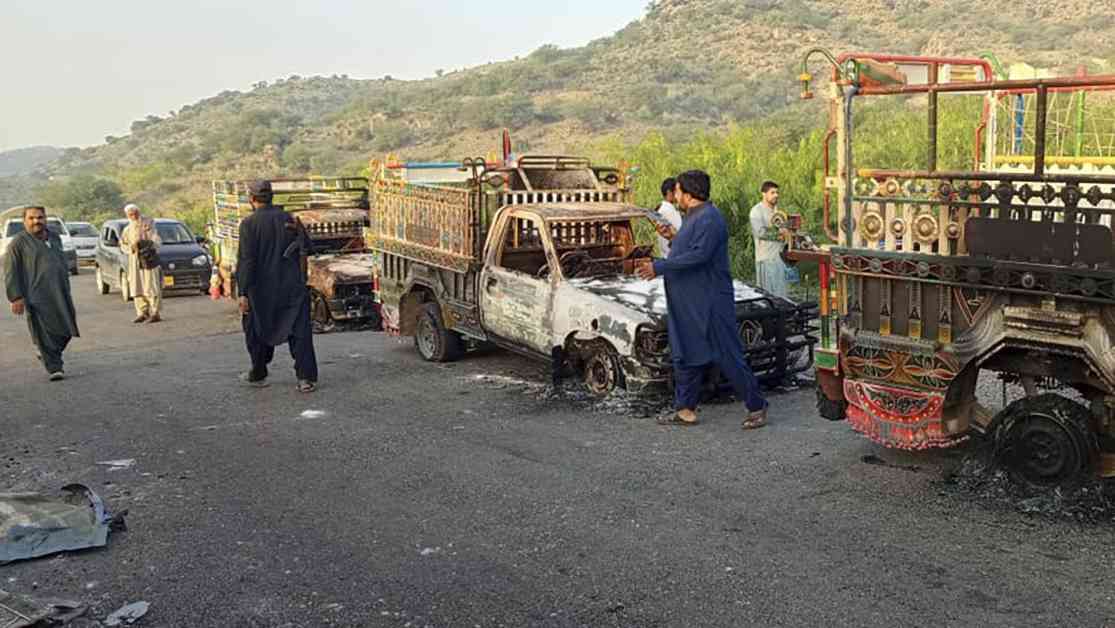Gunmen in southwestern Pakistan carried out deadly attacks on Monday, resulting in the loss of at least 31 lives in two separate incidents. Security forces also engaged with insurgents in a violent confrontation, resulting in the deaths of 12 militants. These incidents occurred in Baluchistan province, a region plagued by ongoing violence and unrest.
Deadly Attacks in Musakhail
The first attack took place in Musakhail, a district in Baluchistan, where gunmen targeted buses, vehicles, and trucks, resulting in the deaths of 23 individuals. After identifying and separating the passengers, the attackers mercilessly gunned them down before setting ablaze several vehicles and fleeing the scene. This brutal act of violence left the community in shock and mourning for the lives lost.
Violence Escalates in Qalat
In a separate incident in Qalat district, also in Baluchistan, gunmen killed nine people, including four police officers and five bystanders. This further escalation of violence underscored the precarious security situation in the region, as authorities grappled with multiple attacks and acts of destruction. The attacks in Musakhail and Qalat were just two examples of the widespread violence that plagued Baluchistan on that fateful day.
Insurgent Activities Across Baluchistan
Apart from the attacks in Musakhail and Qalat, insurgents carried out additional acts of violence in various districts of Baluchistan. These included the blowing up of a railway track in Bolan, an attack on a police station in Mastung, and the assault and burning of vehicles in Gwadar. While no casualties were reported in these incidents, they highlighted the volatile security environment in the province.
The ongoing insurgency in Baluchistan has been a longstanding challenge for Pakistani authorities, with separatist groups seeking independence from the central government in Islamabad. Despite claims of quelling the insurgency, violence has persisted in the region, with civilians bearing the brunt of the conflict. The recent attacks served as a stark reminder of the enduring threat posed by insurgents in Baluchistan.
Separatist Group’s Warning
Prior to the attacks, the outlawed Baluch Liberation Army separatist group issued a warning to the public to stay away from highways as they planned to target security forces. This ominous message foreshadowed the tragic events that unfolded in Musakhail and other parts of Baluchistan. While the BLA did not claim responsibility for the attacks, their presence and influence loomed large over the region.
In response to the violence, security forces in Baluchistan swiftly moved to confront the insurgents, resulting in the deaths of 12 militants. Interior Minister Mohsin Naqvi emphasized that those responsible for the attacks would be held accountable, signaling a firm stance against terrorism and extremism in the country. The government’s commitment to eradicating terrorist elements was reiterated in the face of such senseless acts of violence.
Condemnation and Calls for Action
Public officials and representatives from other provinces, including Punjab, condemned the attacks in Baluchistan and called for decisive action against the perpetrators. Uzma Bukhari, a spokesperson for the Punjab provincial government, expressed grave concern over the violence and urged the Baluchistan provincial government to intensify efforts to combat terrorism. The need for solidarity and cooperation in addressing security threats was underscored in the wake of the tragic events.
Pakistani President Asif Ali Zardari, Prime Minister Shehbaz Sharif, and Interior Minister Naqvi all denounced the attacks as barbaric and vowed to seek justice for the victims. The collective condemnation from national leadership reflected a unified stance against terrorism and extremism, emphasizing the importance of maintaining peace and stability in the country. The government’s commitment to upholding law and order in the face of adversity was reaffirmed through their statements of solidarity and resolve.
Impact on Baluchistan’s Development
Security analyst Syed Muhammad Ali highlighted the economic implications of such attacks on Baluchistan, noting that targeting non-Baluch individuals was a deliberate strategy to weaken the province economically. By instilling fear and insecurity among residents and discouraging outside investment and development, separatists sought to undermine the region’s progress and stability. The long-term consequences of such violence could impede the growth and prosperity of Baluchistan, hindering efforts to improve infrastructure and promote economic growth.
The targeting of workers and civilians from Punjab, a neighboring province, as part of a campaign to drive them out of Baluchistan, underscored the divisive tactics employed by separatist groups. The deliberate attacks on individuals based on their ethnicity or origin further exacerbated tensions and fueled a cycle of violence and retaliation. The need for inclusive and sustainable peace-building efforts in Baluchistan was paramount to addressing the root causes of conflict and promoting reconciliation among diverse communities.
Regional Terrorist Networks
The presence of the Pakistani Taliban in Baluchistan, allied with the Afghan Taliban, added another layer of complexity to the security landscape in the region. The interconnected nature of regional terrorist networks posed a significant challenge to efforts to combat extremism and terrorism. The cross-border collaboration between militant groups underscored the transnational nature of the threat, requiring a coordinated and comprehensive approach to address security challenges effectively.
In a separate attack in Khyber Pakhtunkhwa province, a roadside bomb claimed the lives of four individuals and wounded 12 others in North Waziristan district. The involvement of the Tehreek-e-Taliban Pakistan, a separate group allied with the Afghan Taliban, highlighted the broader security concerns facing Pakistan and the region. The interconnectedness of militant groups and their shared objectives underscored the need for enhanced regional cooperation and intelligence-sharing to counter the evolving threat landscape.
As Pakistan grappled with the aftermath of the deadly attacks in Baluchistan and other regions, the resilience of communities and the resolve of security forces to confront terrorism remained steadfast. The tragic loss of life served as a somber reminder of the ongoing challenges posed by insurgency and extremism, underscoring the need for sustained efforts to promote peace, stability, and reconciliation in the country.
Overall, the incidents in Baluchistan and Khyber Pakhtunkhwa highlighted the complex security dynamics and regional challenges facing Pakistan, necessitating a multifaceted approach to address the root causes of conflict and build a more secure and prosperous future for all citizens. The collective response from government officials, security forces, and civil society underscored the unity and determination to combat terrorism and extremism, safeguarding the country’s stability and well-being.



























